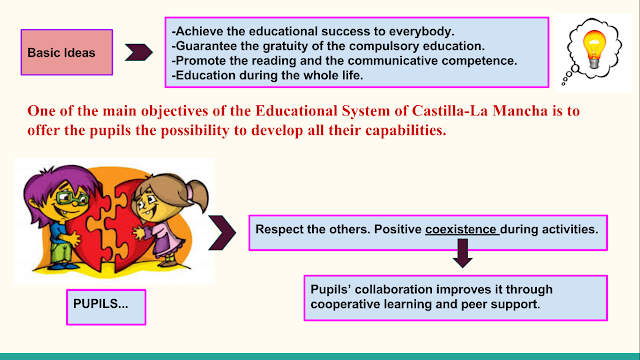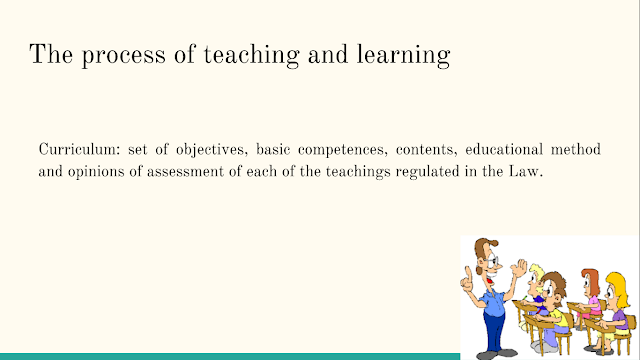This post talks about the Educational Law of Castilla-La Mancha. This topic is very interesting because we can learn the different obectives, principles and the functioning of this law. Is intersting also because is the law of our community.
This task explains the processes that this law makes to achieve the equality between pupils, to all of them have the right to access to the educational system in an equal way for example.
It is not an extensive topic, so the work in group hasn't been difficult. The information was divided into different sections and that's one reason that makes the work easier.
At the end of the task there are some questions about the topic.
This law aims to control the educational system of Castilla-La Mancha into the Spanish Educational System, defining its objectives and principles, excluding the University System of Castilla-La Mancha.
The educational system of Castilla-La Mancha comprises the teachings that are regulated by the Organic Law of May 3rd, 2006, the centres in which these teachings are taught, the educative services and their financing, and the pupils.
It’s important to remember that everybody has the right to access to the educational system in an equal way and the right to select the centre into the educative offer. It will be stablished a common process to admit pupils in public and entered schools to guarantee the effective exercise of these rights.
This law understands the education as a construction process about our own knowledge and the personal and social transformation through the values education, the life quality, the effort and the relationships with other people. This education is important to stablish a coexistence based on respect, solidarity, equality and peace, to prevent conflicts and to solve them through the dialogue, the coeducation and the effective equality between men and women.
According to the educational system of Castilla-La Mancha there are some basic ideas:
-Achieve the educational success to everybody through the individual and collective effort of pupils, families, teachers and the educational administration.
-Guarantee the gratuity of the compulsory education.
-Promote the reading and the communicative competence, and achieve that every pupil could be competent at least in a foreign language at the end of the compulsory schooling.
-The education during the whole life, taking advantage of the teaching modalities.
One of the main objectives of the Educational system of Castilla-La Mancha is to offer to the pupils the possibility to develop all their capabilities, especially the communicative competences in Spanish and foreign language, the scientific thinking and the use of TICs, stimulating the creative thinking, the physical activity and the values education.
Moreover, pupils must respect the other members of the educational community contributing with a positive coexistence during the participation in the activities of the centre. They have to respect their teachers also.
Schools will stimulate the pupils’ collaboration to improve the coexistence through appropriate structures to their age, their educational and personal development and through the cooperative learning and the peer support.
The schools are classified into State and Private. State schools are those whose ownership corresponds to a public administration, and private schools are those that have as holder a natural or legal person.
Private schools benefiting from the subsidy arrangements are legally established Private- Entered (concertado) schools.In accordance with Article 7 of this Law, the public education services will take place through State schools and Private-Entered schools.
 The academic autonomy of organization and management of schools is expressed in the educational project, the project management and the rules of coexistence, organization and operation.
The academic autonomy of organization and management of schools is expressed in the educational project, the project management and the rules of coexistence, organization and operation.
About Private-Entered Schools: They may be benefited from the subsidy the authorized private centers whose character is not inconsistent with Article 84.3 of Law 2/2006 and the rules of Castilla-La Mancha on the admission of students. The Regional Government of Castilla-La Mancha guarantees the right to freedom of choice of schools by parents and the access, on an equal footing, of all citizens to a free education in the second cycle of early childhood education, in compulsory education and in the education that has been declared free, by the programming of the annual supply of school places in public schools and private-entered schools.
 The academic autonomy of organization and management of schools is expressed in the educational project, the project management and the rules of coexistence, organization and operation.
The academic autonomy of organization and management of schools is expressed in the educational project, the project management and the rules of coexistence, organization and operation.
The educational project defines and expresses the identity of the educational institution and the model of education that wants to develop, so it reflects the values, objectives and priorities established by the educational community and the realization, approved by the Council of Teachers, of the curricula established by the Ministry responsible for education.
The educational project will take into account the characteristics of the social and cultural environment of the center.
Pedagogical autonomy is concreted through specific teaching programs. The teaching program is the instrument of planning, development and evaluation of the areas, subjects or curriculum modules.
The governance of schools is the responsibility of the entire educational community that runs through the management team, the School Council and the Council of Teachers, which are the Collegiate Bodies of Government.
The answer to the diversity and educational success of students
The answer to the diversity and educational success of students
The answer to student diversity will be governed by the principles of equal opportunities and universal access, standardization, school inclusion and social integration, flexibility, multiculturalism and coordination between administrations.
It is understood as the response to the diversity set of educational activities aimed at promoting the educational progress of students, taking into account their different capacities, rhythms and learning styles, motivations and interests, social, economic, cultural, linguistic and health situations.
In this context, it is considered pupils with special educational needs attention who, temporarily or permanently, requires ,in a greater or lesser degree, a response itself and individualized to achieve the objectives of the curriculum.
All students who have specific educational needs attention, as well as those who stay one more year in the same course or cycle or promote with failed subjects, must have individualized work plans.
- Study aids and gratuity of curriculum materials.
All students have the right to access, under equal conditions, and according to their socioeconomic status and academic results of their efforts, to the public system of scholarships and grants to study in non-free educational levels, in coordination with the State Administration.
Students of compulsory basic teachings enrolled in schools supported with public funds has the right to use free textbooks or alternative curriculum materials under the conditions established by the Ministry responsible for education.
- The school and its environment
The Ministry responsible for education will encourage the creation of networks of collaboration between schools in order to share resources, experiences and initiatives and develop exchange programs for students and teachers.
There will also be cooperation with the Ministry responsible for education and other Autonomous Communities.
Now I’m going to talk about the cooperation with local authorities, the various local authorities and the Ministry will coordinate their actions and cooperate through protocols, agreements or partnerships in the following actions:
a) Processes of education, monitoring and intervention related to school absenteeism..
b) The development of school support programs, attention to students outside the school schedule or timetable for promoting educational success.
c) Collaboration with local libraries in the reading plan.
d) Planning and evaluation studies in music and dance.
e) Planning and evaluation of complementary meals and transport services.
f) Planning, development and evaluation of extracurricular activities.
In addition the preservation and maintenance of the centers correspond to the municipality. These buildings may not be used for other services.
As for cooperation with other institutions, the bodies of the Regional Government of Castilla la Mancha responsible for everything related to education, facilitate with cooperation agreements and government support the development of actions of volunteerism in education, for following:
- To carry out extracurricular activities.
- Contribute to the opening of schools after school hours
- To contribute to the educational inclusion, participation and social commitment
Extracurricular activities are intended to facilitate the development of the students, their socio-cultural integration and the educational use of their free time to generate habits of participation. These are voluntary and take place outside of school hours teaching programs.
These activities are financed by government grants and contributions from families.
In terms of content, counseling provides that, arts, physical sports, communication skills of coexistence, the use of ICT, respect for the natural heritage and culture should be included.
As for cooperation against absenteeism and dropout, schools take steps to reduce school absenteeism, facilitating the return to education and training of students who have left early without limitations of current regulations. Counseling also establish necessaries for awareness and dissemination of experience on prevention and eradication of school dropout.
In schools we can find the following educational services:
- As for the school transport: this is aimed at students in public schools who are forced to move out of their town. This service will be free for those who attend the second cycle of kindergarten and primary education.
- As for the school canteen: This service is mandatory in public schools in which students have to be moved from the town and have school hours at morning and afternoon. This service will be free for those students who are in a situation of social difficulty
As for public residential schools: aimed at students who for personal circumstances cannot access to the center. The residences are responsible for developing civic values and coexistence.
Promoting reading and multilingualism
In terms of stimulating reading, this will be taken as a basic competency, will be encouraged by the inclusion of a weekly hour curriculum. In order to provide quality staffing and ensuring equal education all schools should have a school library.
As for the bilingual sections, they help to push the values of coexistence and multilingualism and multiculturalism.
Finally I’m going to talk about the qualifications and training of teachers, inside this we can find the continuing training that are defined as the set of actions directed by non-university teachers that promote updating and continuous improvement of their professional qualifications. The aim of this is to provide the teachers of scientific expertise necessary to improve their educational programming and providing faculty development strategies for the educational project.
If you want to ask me something about the topic you can do it putting a comment here or sending me an email: albialbita@outlook.es




























No hay comentarios:
Publicar un comentario